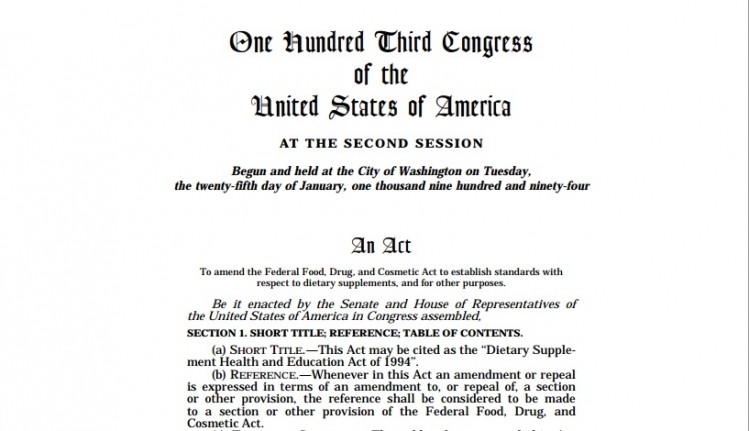Experts dispute notion that DSHEA hamstrung FDA

The meeting, which was organized by The Atlantic magazine and which took place in Aspen, featured six ex commissioners, one of whom was Dr David Kessler, who sat in the top chair from 1990 to 1997. The Dietary Supplement Health and Education Act was written into law during Kessler’s tenure, and most of the most negative comments about the effect that law had on the agency’s ability to regulate supplements came from him.
When asked during the session why the agency doesn’t do more to regulate the industry, Kessler responded, “We tried.”
Kessler, who was trained as a pediatrician and also holds a law degree, has long been characterized as a physician who was philosophically opposed to dietary supplements. The long period between the institution of the bill and the release of a final rule on Good Manufacturing Practices in 2007 has often been cited as an example of the agency’s fundamental unwillingness to put the law into full practice.
Time to understand DSHEA
One of the experts contacted by NutraIngredients-USA is ex-FDA official Brad Williams, who among other posts during his 37-year career at the agency ran the GMP program in the Division of Dietary Supplements (which has since Williams’s retirement been elevated to the status of an ‘office’). Williams doesn’t necessarily agree that the agency had a plan to push DSHEA onto the back burner. Rather, in his view that quiescent period was combination of unfamiliarity with the bill’s provisions and a reaction to the huge amount of public support the bill generated in the form of letters and faxed communications to members of Congress. That groundswell made a big impression, Williams said.
“I was in sort of weird position in that when the law first passed I was at the drug label and compliance side of things at CDER [FDA’s Center for Drug Evaluation and Research]. I was dealing with people in the center for foods who seemed to feel that if they took any enforcement action Congress would have made DSHEA even stronger and would have made things that much more difficult for us,” he said.
“The law passed in 1994 and it took us a while to understand it and to understand what our limits were. The burden of proof (that a product was potentially unsafe) had shifted, no doubt,” Williams said.
GMPs clarified enforcement
Getting the GMP rule done was a critical piece of making DSHEA work, Williams said. It was a difficult road to get to the final rule.
“When we published the first proposed rule I believe we took a document that the industry had generated as a starting point and dolled it up to fit our needs. When we issued the draft we got thousands of comments back. We had to incorporate those into the final rule and then we had to sell that to the Office of Management and Budget. And keep in mind this was during a conservative Republican administration that was not big on regulations. By the end even the industry was screaming that it needed the GMPs,” he said.
But once that piece was in place, the enforcement picture became much clearer, Williams said. Supplements found to have been manufactured not in accordance with GMPs were classified as adulterated, and the existing enforcement machinery that applied to adulterated drugs and foods now applied to them as well.
Kessler’s starting point
Michael McGuffin, president of the American Herbal Products Association, takes a harder line than does Williams on the question of how Kessler viewed supplements and how that affected the agency's actions during the remainder of his tenure. McGuffin said a federal document that is part of an FDA oral history project shows Kessler’s bias. In the transcript of an interview with former FDA official William Hubbard that was conducted in 2005, Hubbard said that Kessler remarked, when looking at a collected sample of dietary supplements, that “This is all junk. It’s not helping anybody, people are spending money on it. We need to do something about it. And some of them are just outright unsafe, such as ephedra."
“That is where Dr Kessler started. He is not an unbiased observer,” McGuffin said. “He was an excellent commissioner in terms of getting things done, especially on tobacco regulation. He didn’t lose much. But then here came this law he was not in favor of and which he was not in control of.”
“I would agree that Kessler lost on DSHEA,” Williams said. “Tony Young and Scott Bass did a great job of putting that draft together and getting it through Congress.”
Temper tantrum?
Marc Ullman, is an attorney who is of counsel at the firm Rivkin Radler who has represented companies in the dietary supplement business for decades, as his recently deceased father, Robert Ullman, did before him. Ullman said that in his view some of the lethargy at FDA stemmed from the sting of having DSHEA thrust upon them. At the time DSHEA was put into place, FDA had among other things taken the stance that some high potency vitamin formulations posed health risks and should be regulated like drugs.
“There just appears to be no interest in demonstrating that the statute can be an effective deterrent. It is an institutional temper tantrum at losing, at not getting what it wanted. The FDA isn’t supposed to lose,” Ullman said.
Ullman said the record of Dan Fabricant, PhD, while he was at the agency shows that vigorous enforcement under DSHEA is possible given enough will. And he noted that all of the commissioners with the exception of Kessler who appeared at the event in Aspen have also testified before Congress that they had sufficient regulatory authority to deal with dietary supplements.
Williams did say that there are internal barriers to enforcement, that are frustrating even to those within the agency.
“We could have gotten more support from general counsel,” Williams said. “There are issues of having enough resources to do the job, even there.”









